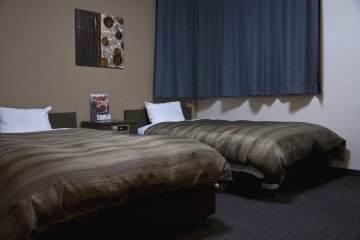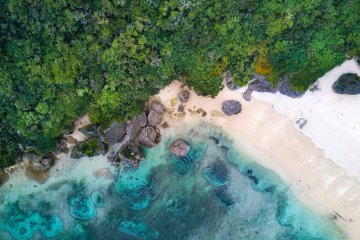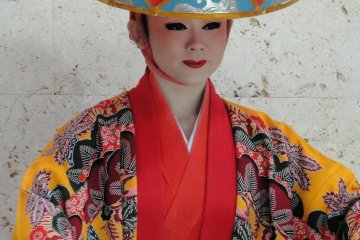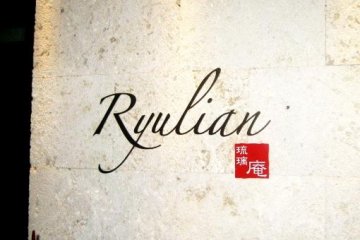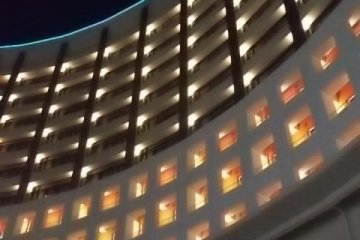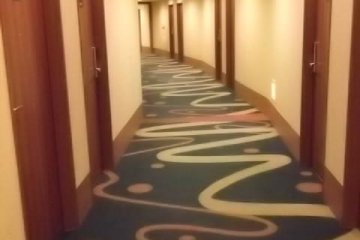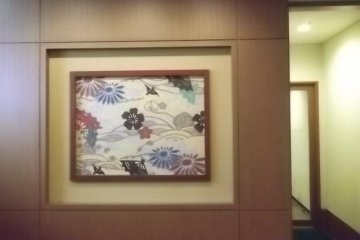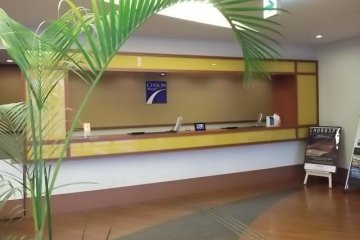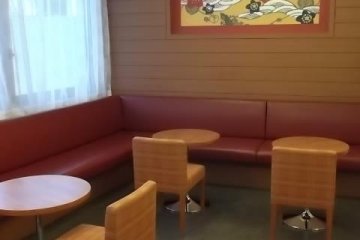Chisun Inns are a nationwide chain of budget hotels, designed to provide reasonable comfort at good value. They’re generally aimed at people traveling on business or driving across country, but in a handful of popular vacation spots around the country there are Chisun Resorts, offering the same kind of value to holidaymakers.
Chisun Resort Naha is typical of the chain, being a little more upscale than the business hotels. The location is very handy, just a few minutes’ walk from Asahibashi monorail station and Kokusai-dori, the bustling touristy shopping street in the heart of the city.
The hotel has vending machines for soft drinks, beer and instant noodles, and just across the road there’s a 24-hour supermarket for other necessities you may need. For an extra few hundred yen there’s a buffet breakfast, providing a mix of Japanese and western food. There’s rice, fish, salad and miso soup, but also eggs, sausages, cereal and toast, along with coffee, tea and juice; if you’re not in a hurry it’s a nice way to start the day.
My room was pretty boxy, but perfectly comfortable, with enough space to hang my clothes and put my bags down. The color scheme of warm earthtones and small touches like the little picture on the wall above the bed made the room feel cosier and less sterile than other business hotels I’ve stayed at, and the prints on the walls around the hotel lent a distinct Okinawan touch . The bathroom was also compact, with a good powerful shower, and is also equipped with a line to hang your clothes to dry if you do your laundry in the hotel’s washing machines.
The hotel is part of a complex which includes the much swankier Loisir Hotel, where you can indulge in massages, facials and other treatments, or load up on manifold Okinawan goodies at their well-stocked souvenir shop. For just an extra ¥1000 one-off payment, I was able to use their heated pool for the length of my stay, as well as the attached jacuzzi and sauna, and Chisun guests are also able to enjoy the Loisir’s butterfly-shaped outdoor wave pool, which sometimes doubles as a dinner and entertainment venue in the evenings.
As well as the shops and nightlife around Kokusai-dori, the city boasts a handful of attractions, all easily reached either by walking or on the monorail. There’s a traditional Chinese garden complete with pagodas and moon gates, venerable Shuri-jo castle, and a couple of art and history museums. The covered shopping arcades off Kokusai-dori lead to the Tsuboya pottery district, where there’s a small museum and plenty of shops selling ceramic goods.
Booking is easy on the English website, and if you reserve far enough in advance there are real bargains to be had, with room prices sometimes below ¥6000 a night, though prices vary with season, availability and room type. It’s not a luxurious place to stay, but for budget-conscious travelers or backpackers looking for a break from dorms, it’s a good choice in a good location at a good price.



